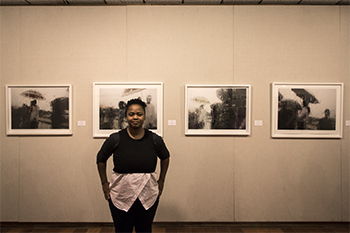
Nomusa Makhubu’s work will be exhibited for the next
few weeks at the Johannes Stegmann Art Gallery.
Photo: Kara Schoeman
“It is this sense of ownership, or the loss thereof, that I would still like to explore.” Exploring issues of identity, and more particularly, the sensitive issue of representation through the medium of photography, is exactly what Nomusa Makhubu sets out to do in her exhibition entitled Intertwined 2005 – 2017.
The issue of self-representation
This solo exhibition is a survey of Makhubu’s practice as a lens-based artist working mainly with portraiture, performance and space-time politics. Her exhibition includes the series entitled, Trading Lies, Self-Portrait Project, Inquietude, The Flood and In Living Colour.
The exhibition, in association with Erdmann Contemporary, is on display in the Johannes Stegmann Art Gallery at the University of the Free State from 24 May to 23 June 2017. She has exhibited in Africa, Europe, the US, and China.
Throughout this exhibition, Makhubu focuses on the issue of self-representation, but also brings in geographical locations to question the assumed universality and objectivity of time and place.
Not only an artist, but a writer too
As an award-winning artist, academic and a full-time lecturer at Michaelis School of Fine Art at the University of Cape Town, Makhubu is a force to be reckoned with in the art world. She has also contributed her writing to Critical Arts, African Arts, the Journal of African Cultural Studies and Third Text, as well as other book projects and catalogues.